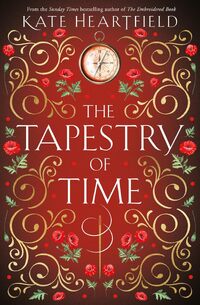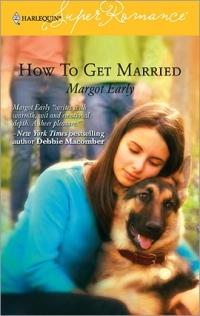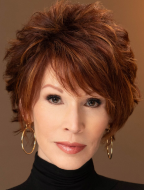 THE TAPESTRY OF TIME |
 Sunshine, secrets, and swoon-worthy stories—June's featured reads are your perfect summer escape. |

Purchase
Harlequin Superromance Romance Series Excerpt of How To Get Married by Margot EarlyOuray, Colorado THE DISORIENTATION WAS BACK. Well, not back. It had never left, simply became worse when any loud sound intruded on her world. And music — music was not the same. Sophie could hardly bear to listen now or try to sing because it terrified her. It terrified her that crystal clear had changed to an underwater-like whining, to distortion, to an unsilence that made one ear worse than useless, disallowing enjoyment of the other's perfection. A virus had done it, a virus others had caught as well, but it hadn't wrecked their ears. The doctors had said her hearing might improve with time, that many people did eventually get better on their own. Two long courses of prednisone that had kept her insomniac, alternately terrified that her gift was lost and manically convinced that her genius, like Beethoven's, could transcend this. Months of oxygen therapy. Acu- puncture. Sessions with a Lakota medicine man and then with a shaman from the Andes. Anything, anything, to help. One perfect ear, and one ear with severe hearing loss and twelve percent speech discrimination. She'd nearly been hit by cars twice — or would have been. But the dogs both knew. Somehow they knew, and Cinders had shoved herself between the car and Sophie, pushing her mistress clear, while a car horn blared, painful, making the world rock. Loki had developed the habit, suddenly, of crowding Sophie's left thigh, as though anticipating the kind of trouble Cinders had averted. Sophie had come back to Ouray, telling herself there were fewer cars here and less noise. She'd stay at her parents' summer place, the home they'd bought long ago for a retirement that had finally arrived. Sophie had brought her own home, too, her custom-built wayfaring wagon, styled after an English gypsy wagon — for when her parents arrived in June, just in case. Just in case they drove her crazy — and the reverse, of course. Ouray seemed unchanged from when she'd visited for three weeks each summer growing up. It was summer now. The mountains were steadfast, rising steeply on each side of town, charming Victorian homes nestled at the valley's narrow head. And there were plenty of cars, not a parking space to be found on Main Street, definitely not for a rig like hers, a truck hauling a gypsy wagon. And there was too much noise. What if it doesn't get better? What if I always hear like this? Braking the Tundra for some tourists trying to cross Main Street, she glanced behind her at Loki, front paws hanging over the back seat of the dual cab, dark brown eyes intelligent and concerned. Cinders had the bed on the floor behind the passenger seat. I'll still have my dogs. She laughed, half-hysterically. After everything. After backbreaking work, after sacrifices — one sacrifice too keen to be counted — after fighting and winning, was she now to lose it all? So — back to the scene of the crime. Back here again. It had happened long ago, but she would never stop thinking about it, never stop remembering, never stop wondering what her life would have been like, where that child, fourteen this summer, was now. Sophie Creed, thirty-two, was attractive — some said beautiful — successful and talented, a musician whose hearing was suddenly compromised. She should go to the market before she arrived at the house. She could have gotten groceries in Mont-rose but hadn't wanted to face a big store. It wasn't that she'd be recognized. That seldom happened. It was just the sound — the noise. The doctors had said she'd become accustomed. Sophie didn't want to get used to it. She wanted her hearing back. She sang. Every day she still sang. And danced. And played the harmonica and her violin. Bearing it. But music brought tears because sound that had been clear and perfect was now distorted. She had passed the market when she saw a delivery truck leaving a place on the right, on the lower side, the west side, of the wide, sharply tilted street. Surely she could pull over there for long enough to run into the store. Sophie switched on her turn signal, waited, parked carefully along the curb. She'd put the dogs in the truck bed. They'd be happier waiting there. Someone had told her she could train one or both of them as hearing dogs. As far as Sophie was concerned, they'd already begun that job, were already doing it. Both knew. Loki, the sable shepherd she'd gotten from the humane society, seemed to realize her plight. But Cinders, a long- haired sable she'd bought three years earlier from a breeder whose grail was Westminster — Cinders acted. As she loaded them into the back of the truck, Sophie admired their muscles, their lustrous coats, the tall set of their ears. Sound roared in her own ears, and she jumped as a car passed. The cacophony in her bad left ear was so overwhelming that she couldn't, in that moment, hear properly out of her right. And she couldn't hear where the sound had originated, had no directional orientation. She jumped when she saw someone just beside her. "Sorry," the girl apologized. She was a young teenager, dark- haired, with very fair skin, a few freckles, glasses and braces. "I just...your dogs." Sophie said, "What?" Another car passed, and she started. "I'm sorry. I have a hearing problem right now." She'd had it for five months. Some people got better; some didn't. A hearing aid wouldn't help but would only make it more difficult to hear from her good ear. Plugging the left ear didn't really help, either. And that was for normal functioning. But she was a musician. "Your dogs are beautiful. I wanted to see them. My dad...dogs." "You can pet them." Sophie tried not to jump as another vehicle passed. The girl offered a closed hand to Cinders for the bitch to sniff. Loki hung back, reserved. His appearance was obviously European — blocky-headed, sturdy, powerful, extraordinarily male. He and Cinders looked like two different breeds, beautiful in different ways. Cinders had good hips. Loki's were fair. Sophie studied the girl. She had excellent posture, seemed self-possessed, with some regal characteristic beyond dignity that acknowledged neither nearsightedness nor braces. Her hair shone smooth, almost black with just a hint of dark red. Behind her glasses, her eyes were brown. Her coloring was not unlike Sophie's, fair, with a good complexion. And Sophie, tired of contact lens problems at gigs, had undergone laser surgery on her eyes four years before. "Do you live here?" she asked, to be polite. An eighteen- wheeler, down off Red Mountain Pass, rumbled by, and Sophie tried not to cringe. I have to get away from this noise. The girl nodded. "We train protection...I said. Also bomb, drug...that kind of thing. Mostly...obedience now. Aggression problems. My dad used to be... Then he..." No hesitation in the words, but Sophie's hearing missed some. She watched the teenager's lips, collecting and failing to collect information. "Did you grow up here?" Not caring, being polite. "We lived in Denver...eight. Then, my dad...retired...K- 9... But he grew up here — well, kind of. His parents helped raise me. My mom died when I was a baby." The skin on the back of Sophie's neck hummed, electric, her whole body sharply aware. She knew. Not in words. In her bones. She didn't yet know what she knew, but every part of her was knowledge. "Who is your father?" "William Ludlow. I'm Amy." That was what she knew. The other thing she knew, seeing the girl's brown eyes that were the same shape as her own, with the same slightly lush, slightly curling, sable lashes, was that Amy Ludlow's mother had not died when Amy was a baby. Amy's mother was Sophie Creed. DEAD? That had not been part of the agreement, the solemn agreement she'd made with William Ludlow not long after her eighteenth birthday. It seemed unlikely to her, almost unbelievable, that skinny black-haired William Ludlow with his clear brown eyes, with his heavy black brows, had become a cop. He had been a writer; his interests were languages and math. He'd been to school all over the world, spent time in Papua New Guinea, Indonesia, Irian Jaya, places like that. His father was an ethnolinguist, specializing in the languages of New Guinea. When Sophie met William, he'd been familiar with seven or eight languages (three of them dead) besides English, plus some tribal dialects absolutely useless unless one were to travel to these places, where people practiced customs Sophie had found both horrifying and fascinating. And he'd had a plan. Whenever anyone asked him what he was going to be, his answer was always the same. An ethnologist and author. He'd wanted to study other cultures, whether Hasidic Jews in New York or indigenous peoples of the Arctic. How could he have become a cop? She hadn't asked Amy. He'd chosen their daughter's name, and Sophie hadn't argued, hadn't much cared. William had told Amy that her natural mother was dead. No. That was not part of the agreement. Pulling the truck and wagon to the curb outside her parents' four-square Victorian, Sophie tried to shrug it off. What, after all, had she expected of him? Her father was a minister — her parents' life was about God — but when she'd revealed that she was pregnant, William had become even more traditional than she was. He'd mentioned — once — her abandoning Amy, which had rubbed Sophie more than a little wrong. She'd been adopted herself, had never believed herself abandoned and never felt a burning desire to look for her birth parents. Besides, William's parents were going to help him with the baby. But next her status as an adopted child slash birth mother had come up for review. William had suggested — again, only once — that she'd felt compelled to give up Amy to justify her own birth mother's having relinquished her. Sophie hadn't told Amy her name. But Amy had said where to find Mount Sneffels K-9. The property was off the Camp Bird road, on the way up to Yankee Boy Basin, she'd said. We breed them, too, but we don't have any litters right now. So many people are bringing dogs for us to train. We have German shepherds, though, and Dutch shepherds, and a Dogue de Bordeaux. Our German shepherds come from Czechoslavakia, and one of our studs is a black sable. Your dark sable reminds me of him. Or so Sophie thought she'd said. Would she take Amy up on her invitation to visit Mount Sneffels K-9? Ever since she'd relinquished her infant daughter, walked away from her for reasons of foresight and maturity, she'd known that if she really wanted, she could find William Ludlow and contact him again and meet the daughter she'd let go. But she'd never planned to do it. She'd planned not to contact Amy. Amy had been born in Glenwood Springs. During her pregnancy, Sophie had lived in nearby Carbondale with William. She hadn't wanted the people of Ouray to know she was pregnant. If they didn't know, they couldn't tell the child the identity of her birth mother. Later she'd typed up something for William to give Amy, a description of herself, of her health issues as she knew them, of her talents and dreams. That, she had reasoned, would allow Amy to develop a healthy identity. Had William even shared the information she'd left for their daughter? She trembled in the afternoon shadows — shade cast by the mountains that clutched the town. She unloaded the dogs and took them up to the house, unlocked the door. Did her parents know? William and Amy had obviously been in Ouray for some time. Wasn't it likely that her parents had run into one or both of them? And they'd always liked William, despite their disapproval of sexual activity outside marriage. Sophie loved the Ouray house. On her brief, infrequent trips to Ouray since leaving home, she had helped her parents with what she called the house's "salvage style." Even the front door, with its Arts and Crafts stained glass, had been rescued from a condemned building in Salt Lake City. Sophie had come across the door during some rare downtime on tour. And in the foyer sat two Gothic Revival chairs she and her mother had refinished and reupholstered, working together, trying to make their work as like each other's as possible. Sophie had been looking forward to seeing her parents. But what if they knew William was in Ouray? The last Sophie had heard, William and Amy had moved away. Excerpt from How To Get Married by Margot Early |
|
| |||
|
||||



 © 2003-2025
© 2003-2025